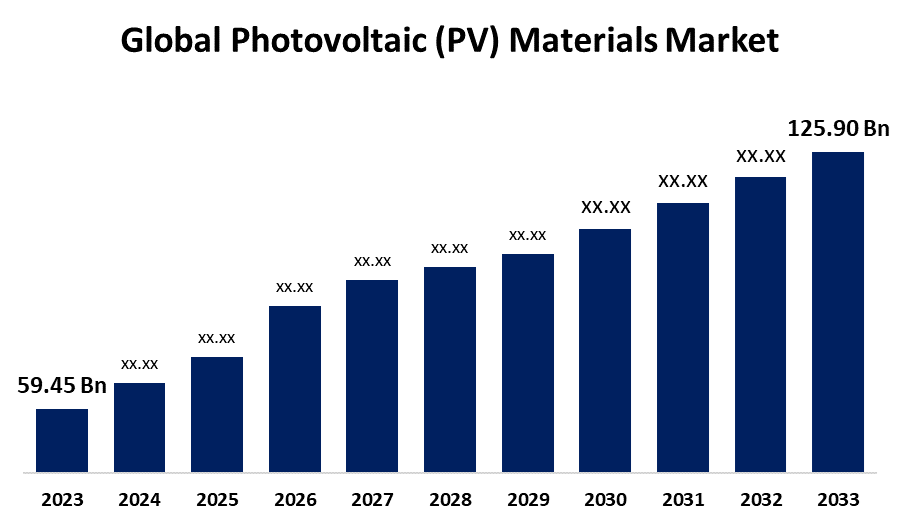Global Photovoltaic (PV) Materials Market Size, Share, and COVID-19 Impact Analysis, By Type (Thin Film, Crystalline Materials, and Others), By Material (Silicon-based and Non-Silicon based), By End Use (Residential, Commercial & Industrial, and Utility), and By Region (North America, Europe, Asia-Pacific, Latin America, Middle East, and Africa), Analysis and Forecast 2023 - 2033
Industry: Energy & PowerGlobal Photovoltaic (PV) Materials Market Insights Forecasts to 2033
- The Global Photovoltaic (PV) Materials Market Size was Valued at USD 59.45 Billion in 2023
- The Market Size is Growing at a CAGR of 7.79% from 2023 to 2033
- The Worldwide Photovoltaic (PV) Materials Market Size is Expected to Reach USD 125.90 Billion by 2033
- North America is Expected to Grow the fastest during the forecast period.

Get more details on this report -
The Photovoltaic (PV) Materials Market Size is Anticipated to Exceed USD 125.90 Billion by 2033, Growing at a CAGR of 7.79% from 2023 to 2033.
Market Overview
The electric energy generated directly from solar radiation utilizing the photovoltaic effect is known as photovoltaic energy (PV). Semiconductor materials exhibit this effect because of their transitional conductive properties between insulators and a conductor. Solar energy is converted into electrical energy using photovoltaic (PV) materials and equipment. A single photovoltaic cell is generally tiny, with a power output of only one or two watts. These cells are frequently thinner than four human hairs and are composed of various semiconductor materials. Cells are encased in a combination of glass and plastics to protect them from the elements for an extended period. Strong market growth has been caused by factors such as growing worldwide energy needs, a quick shift to sustainable energy sources, technological developments in photovoltaic (PV) materials, and lower costs for solar power solutions. Furthermore, According to, the Ministry of New & Renewable Energy Government of India in November of 2021, the Indian government has created a PLI plan for the solar cell manufacturing sector to increase domestic production capacity and lessen the country's reliance on foreign solar modules. Producers are incentivized under this approach based on incremental sales in the photovoltaic (solar PV) sector.
Report Coverage
This research report categorizes the market for the photovoltaic (PV) materials market based on various segments and regions forecasts revenue growth and analyzes trends in each submarket. The report analyses the key growth drivers, opportunities, and challenges influencing the photovoltaic (PV) materials market. Recent market developments and competitive strategies such as expansion, product launch, and development, partnership, merger, and acquisition have been included to draw the competitive landscape in the market. The report strategically identifies and profiles the key market players and analyses their core competencies in each sub-segment of the photovoltaic (PV) materials market.
Global Photovoltaic (PV) Materials Market Report Coverage
| Report Coverage | Details |
|---|---|
| Base Year: | 2023 |
| Market Size in 2023: | USD 59.45 Billion |
| Forecast Period: | 2023 - 2033 |
| Forecast Period CAGR 2023 - 2033 : | 7.79% |
| 2033 Value Projection: | USD 125.90 Billion |
| Historical Data for: | 2019-2022 |
| No. of Pages: | 235 |
| Tables, Charts & Figures: | 108 |
| Segments covered: | By Type, By Material, By End Use, By Region and COVID-19 Impact Analysis. |
| Companies covered:: | Wacker Chemie AG, DuPont, Honeywell International Inc., COVEME s.p.a., Targray, HANGZHOU FIRST APPLIED MATERIAL CO., LTD., Mitsubishi Materials Corporation, SunPower Corporation, Novo Polymers NV, Ferrotec Holdings Corporation, Jinko Solar, Merck KGaA, Tata Power Solar Systems Limited, Convestro AG, and other key vendors. |
| Pitfalls & Challenges: | COVID-19 Empact, Challenge, Future, Growth, & Analysis |
Get more details on this report -
Driving Factors
The market for photovoltaic (PV) materials is driving to increase as a result of several important factors, including the growing need for renewable energy sources, decreasing expenses of solar energy systems, and supportive government regulations. The growing affordability of solar energy systems is a significant driving factor for the PV materials market. Solar energy has grown more affordable and accessible for both individuals and businesses in recent years due to its enormous expense reduction. The main causes of this have been improvements in production techniques and advances in technology.
Restraining Factors
The market for photovoltaic (PV) materials is restricted due to technical difficulties that may arise while integrating solar energy into the current electrical systems. Upgrades and investments in grid infrastructure are required to manage and balance fluctuating renewable energy sources, such as solar power, with conventional power sources. Complicated permission procedures, unclear policies, and a lack of incentives can all restrict market expansion.
Market Segmentation
The photovoltaic (PV) materials market share is classified into type, material, and end use.
- The crystalline materials segment dominates the market with the highest market share through the forecast period.
Based on the type, the photovoltaic (PV) materials market is categorized into thin film, crystalline materials, and others. Among these, the crystalline materials segment dominates the market with the highest market share through the forecast period. The primary substance used in solar panels, crystalline silicon, has excellent conversion efficiency rates that lead to higher energy output and lower material requirements. The cost of crystalline silicon has decreased significantly due to efficiencies of scale and an effective production infrastructure, making it a more practical choice compared to other materials.
- The silicon-based segment is projected to hold the largest market share through the forecast period.
Based on the material, the photovoltaic (PV) materials market is categorized into silicon-based and non-silicon based. Among these, the silicon-based segment is projected to hold the largest market share through the forecast period. This can be attributed to such materials' increased efficacy rates, resilience, and affordability. The financial benefits of silicon-based solar panels have increased due to the substantial cost reductions brought about by the maturity of silicon technology and economies of scale attained through large-scale manufacturing.
- The commercial & industrial segment accounted for the largest revenue share over the forecast period.
Based on the end use, the photovoltaic (PV) materials market is categorized into residential, commercial & industrial, and utility. Among these, the commercial & industrial segment accounted for the largest revenue share over the forecast period. The growing popularity of ground-mounted solar systems, solar carports, and rooftop solar panels all of which significantly reduce power costs and contribute to sustainability. Demand for solar products has increased as a result of government programs, tax credits, and rebates that encourage commercial and industrial enterprises to participate in solar energy.
Regional Segment Analysis of the Photovoltaic (PV) Materials Market
- North America (U.S., Canada, Mexico)
- Europe (Germany, France, U.K., Italy, Spain, Rest of Europe)
- Asia-Pacific (China, Japan, India, Rest of APAC)
- South America (Brazil and the Rest of South America)
- The Middle East and Africa (UAE, South Africa, Rest of MEA)
Asia Pacific is anticipated to hold the largest share of the photovoltaic (PV) materials market over the predicted timeframe.

Get more details on this report -
Asia Pacific is projected to hold the largest share of the photovoltaic (PV) materials market over the predicted timeframe. This dominance due to the rising demand for solar energy is one of the main factors propelling growth in the Asia Pacific region. China, Japan, and India are among the nations that are rapidly building up their solar energy capacity to fulfill their rising energy needs and prevent themselves from fossil fuels. The need for photovoltaic materials, including back sheets, encapsulants, and solar cells, is being driven by technology. There is a sizable market for solar energy solutions in this region due to its high population, continuously growing production sector, and related energy needs.
North America is expected to grow at the fastest CAGR growth in the photovoltaic (PV) materials market during the forecast period. This North America region has set in place extensive incentive schemes, such as tax breaks and financial aid, to promote the uptake of solar energy systems. Concerns about climate change are driving more and more people in the residential sector to choose renewable energy sources like solar and wind power. Furthermore, substantial expenditures on R&D have resulted in advances in PV technology, which have raised efficiency and decreased costs.
Competitive Analysis:
The report offers the appropriate analysis of the key organizations/companies involved within the photovoltaic (PV) materials market along with a comparative evaluation primarily based on their product offering, business overviews, geographic presence, enterprise strategies, segment market share, and SWOT analysis. The report also provides an elaborative analysis focusing on the current news and developments of the companies, which includes product development, innovations, joint ventures, partnerships, mergers & acquisitions, strategic alliances, and others. This allows for the evaluation of the overall competition within the market.
List of Key Companies
- Wacker Chemie AG
- DuPont
- Honeywell International Inc.
- COVEME s.p.a.
- Targray
- HANGZHOU FIRST APPLIED MATERIAL CO., LTD.
- Mitsubishi Materials Corporation
- SunPower Corporation
- Novo Polymers NV
- Ferrotec Holdings Corporation
- Jinko Solar
- Merck KGaA
- Tata Power Solar Systems Limited
- Convestro AG
- Others
Key Target Audience
- Market Players
- Investors
- End-users
- Government Authorities
- Consulting And Research Firm
- Venture capitalists
- Value-Added Resellers (VARs)
Recent Developments
- In July 2024, Jinko Solar declared that it has become the biggest solar panel supplier for Adani Green Energy Ltd (AGEL)'s solar energy project in Gujarat's Kutch region. The company supplied approximately 2381 MW of solar panels to this project, which included the Tiger Neo Bifacial (1370 MW) and Tiger Pro Bifacial modules (1011 MW).
- In May 2024, Midsummer, a wholesale supplier of green power systems, has teamed up with InstaGroup to offer its first fully integrated photovoltaic (PV) system, InstaGen.
Market Segment
This study forecasts revenue at global, regional, and country levels from 2020 to 2033. Spherical Insights has segmented the photovoltaic (PV) materials market based on the below-mentioned segments:
Global Photovoltaic (PV) Materials Market, By Type
- Thin Film
- Crystalline Materials
- Others
Global Photovoltaic (PV) Materials Market, By Material
- Silicon-based
- Non-Silicon based
Global Photovoltaic (PV) Materials Market, By End Use
- Residential
- Commercial & Industrial
- Utility
Global Photovoltaic (PV) Materials Market, By Regional Analysis
- North America
- US
- Canada
- Mexico
- Europe
- Germany
- UK
- France
- Italy
- Spain
- Russia
- Rest of Europe
- Asia Pacific
- China
- Japan
- India
- South Korea
- Australia
- Rest of Asia Pacific
- South America
- Brazil
- Argentina
- Rest of South America
- Middle East & Africa
- UAE
- Saudi Arabia
- Qatar
- South Africa
- Rest of the Middle East & Africa
Frequently Asked Questions (FAQ)
-
1. What is the CAGR of the global photovoltaic (PV) materials market over the forecast period?The global photovoltaic (PV) materials market is to expand at 7.79% during the forecast period.
-
2. Which region is expected to hold the highest share of the global photovoltaic (PV) materials market?The Asia Pacific region is expected to hold the largest share of the global photovoltaic (PV) materials market.
-
3. Who are the top key players in the photovoltaic (PV) materials market?The key players in the photovoltaic (PV) materials market are Wacker Chemie AG, DuPont, Honeywell International Inc., COVEME s.p.a., Targray, HANGZHOU FIRST APPLIED MATERIAL CO., LTD., Mitsubishi Materials Corporation, SunPower Corporation, Novo Polymers NV, Ferrotec Holdings Corporation, Jinko Solar, Merck KGaA, Tata Power Solar Systems Limited, Convestro AG, and others.
Need help to buy this report?